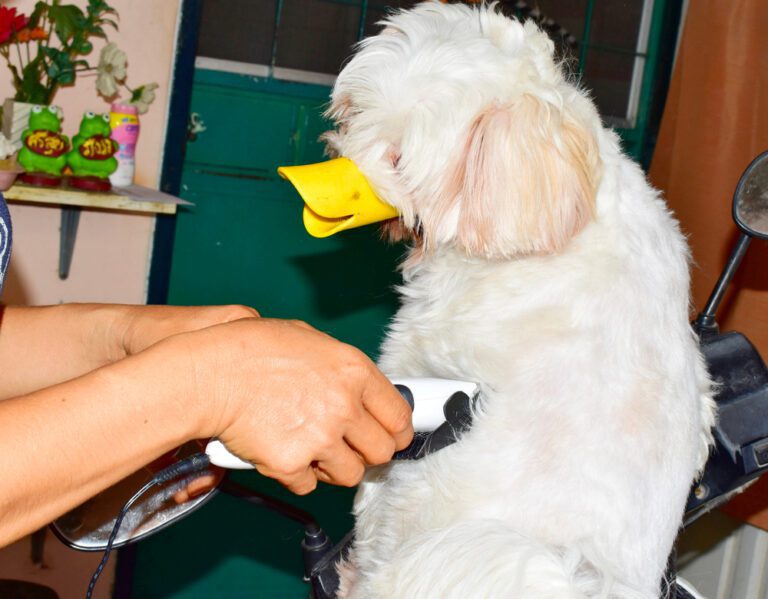Are Shih Tzu Stubborn
Are Shih Tzu Stubborn: The Shih Tzu, a small toy breed from Tibet developed in China, is renowned for its unique and endearing characteristics. These dogs typically weigh 9 to 16 pounds and stand about 8 to 11 inches tall at the shoulder. Shih Tzus are characterized by their long, flowing double coat, which often requires grooming to maintain its luxurious appearance.
One of the most striking aspects of the Shih Tzu is its facial expression. With large, expressive eyes and a short, flat face, they have an irresistibly cute appearance. Their name, “Shih Tzu,” translates to “Lion Dog,” possibly because they resemble lions. These dogs exude charm and elegance with their confident and proud gait.
Shih Tzus are adored for their affectionate and friendly disposition, making them exceptional companions suitable for various people, from families to singles and seniors. Their adaptability and love for human interaction have earned them a reputation as charming and adorable pets. However, it’s essential to understand their behavior and temperament to forge a strong and healthy bond with these lovable companions.
Understanding Shih Tzu Behavior
Shih Tzus possess a distinct set of behaviors and instincts that make them unique in the canine world. Understanding these characteristics is fundamental to effectively managing their behavior and ensuring a harmonious relationship between the dog and its owner.
One of the critical behavioral traits of Shih Tzus is their affectionate and friendly disposition. They cherish human companionship and frequently establish strong, lasting connections with their owners. This trait is rooted in their history as companion dogs, where they were bred specifically to be affectionate and loyal companions to Chinese royalty.
Shih Tzus are also known for their playful nature. They enjoy interactive playtime and are often seen engaging in games like fetch or tug of war. Their enthusiasm and joyful spirit make them delightful playmates for people of all ages.
However, it’s essential to note that Shih Tzus can sometimes be stubborn. While their sweet disposition is a defining feature, their stubbornness occasionally poses challenges during training. This stubborn streak is influenced by various factors, including genetics, upbringing, and the environment in which they are raised.
Understanding these inherent behaviors and instincts in Shih Tzus provides a foundation for successful training and ensures a happy and healthy relationship between the dog and its owner.

Factors Influencing Shih Tzu Stubbornness
Stubbornness is a trait that can surface in many dogs, including Shih Tzus. It’s essential to explore the factors contributing to this behavior to address and manage it effectively.
One of the primary factors influencing stubbornness in Shih Tzus is genetics. Just like humans inherit certain traits from their parents, dogs inherit behavioral tendencies from their ancestors. Some Shih Tzus may have a genetic predisposition to be more stubborn than others, making them more challenging to train.
Upbringing plays a significant role in a dog’s behavior, including stubbornness. Puppies that are not properly socialized and trained from a young age may develop undesirable behaviors. Inconsistent or ineffective training methods during the critical developmental stages can contribute to stubbornness in adult Shih Tzus.
The environment in which a Shih Tzu is raised also affects their behavior. An environment with limited exposure to various people, animals, and experiences can lead to fear or anxiety, which may manifest as stubborn behavior.
By understanding these determinants of stubbornness in Shih Tzus, owners can tailor their training approaches and environments to address and mitigate stubborn tendencies effectively.
Training Challenges with Shih Tzus
While Shih Tzus are undoubtedly charming and loving, they can present specific challenges when it comes to training. Recognizing these hurdles is the first step toward overcoming them and ensuring a well-behaved and obedient furry companion.
One of the primary challenges when training Shih Tzus is their tendency towards stubbornness. These little dogs can be pretty determined and may choose to do things their way. Distractibility is another hurdle to navigate. Shih Tzus are naturally curious and easily lured by attractive scents or sounds, making it challenging to keep their attention. Additionally, their short attention spans can pose an obstacle in training sessions, as they might quickly lose interest.
Positive Reinforcement Training for Shih Tzus
Positive reinforcement training is an effective and humane method for teaching Shih Tzus new behaviors and commands. This approach focuses on rewarding desired actions with praise, treats, or other forms of positive reinforcement rather than using punishment or intimidation.
The benefits of positive reinforcement training for Shih Tzus are numerous. It creates a positive and enjoyable learning experience for the dog. By associating good behavior with rewards, Shih Tzus is likelier to repeat these behaviors willingly. This approach also strengthens the bond between the dog and its owner, fostering trust and cooperation. Positive reinforcement training is particularly well-suited to Shih Tzus because they thrive on human interaction and respond positively to affection and rewards. This method can motivate them to learn and obey commands while keeping their spirits high.

Tips for Dealing with Stubborn Shih Tzus
Dealing with a stubborn Shih Tzu requires a patient and gentle approach. Here are some practical tips to help you manage their stubborn streak effectively:
1. Consistency
Be consistent in your commands, expectations, and rewards. Shih Tzus responds well to routines, so providing a consistent environment will aid their training.
2. Positive Reinforcement
As mentioned earlier, positive reinforcement is a powerful tool. Reward desired behaviors with treats, praise, or affection to encourage compliance.
3. Short Training Sessions
Given their short attention spans, keep training sessions brief and engaging. Engaging in multiple short training sessions spread throughout the day can yield better results than a single lengthy training session.
4. Use High-Value Treats
Shih Tzus are often food-motivated. Offer high-value treats to maintain their interest during training.
5. Be Patient
Stubbornness may test your patience, but getting frustrated won’t help. Stay calm and composed to create a positive learning atmosphere.
6. Socialization
Expose your Shih Tzu to various people, animals, and experiences from a young age. This can help reduce anxiety and stubborn behavior in unfamiliar situations.
By implementing these tips and maintaining a positive, patient, and consistent training approach, you can navigate the challenges of stubbornness in Shih Tzus while fostering a strong and loving bond.
Common Shih Tzu Behavior Problems
While Shih Tzus are beloved for their charming personalities, they can occasionally exhibit behavior problems that require attention and correction. Understanding these common issues is crucial for responsible pet ownership and ensuring a harmonious relationship with your furry friend.
Barking
Shih Tzus is vocal, and excessive barking is a frequent concern. They may bark to express excitement, fear or to communicate. Addressing this issue involves understanding the triggers and employing effective techniques to control barking without squashing their natural vocal tendencies.

Housebreaking Issues
Housebreaking or potty training problems can be challenging, especially with Shih Tzu puppies. They may need help with consistency in bathroom habits. Effective housebreaking involves setting a routine, monitoring their behavior, and rewarding successful outdoor trips.
Separation Anxiety
Shih Tzus are known for their attachment to their owners, which can sometimes lead to separation anxiety. This condition can result in destructive behavior when left alone. It’s essential to gradually acclimate your Shih Tzu to being alone and provide comfort and distractions during your absence.
Shih Tzu Obedience Training
Obedience training is a fundamental aspect of responsible dog ownership and a means to ensure your Shih Tzu’s safety and well-being. This section delves into the details of obedience training tailored to the Shih Tzu breed.
Obedience training involves teaching your Shih Tzu fundamental commands that enhance their behavior and ensure their safety. Basic commands like “sit,” “stay,” and “come” are essential building blocks of obedience training.
Teaching “Sit”
Start by holding a treat above your Shih Tzu’s head and slowly moving it backward. As your dog follows the pleasure with their eyes, they will naturally sit down. Reward them with the treat and praise, repeating the process until they associate the command with the action.
Teaching “Stay”
“Stay” is crucial for your Shih Tzu’s safety. Begin by having your dog sit. Show your palm, signaling “stop,” and step back if your dog remains seated, reward and praise. Progressively extend the distance and the duration of the “stay” command.
Teaching “Come”
“Come” ensures your Shih Tzu returns to you when called. Use a cheerful tone and enticing body language. Start in a safe, enclosed area and contact your dog’s name, followed by “come.” When they approach, reward and praise them, over time, practice this command in various settings.
Practical obedience training is built on patience, consistency, and positive reinforcement. With time and effort, your Shih Tzu can master these basic commands, leading to a more well-behaved and safer pet.
The Importance of Consistency in Shih Tzu Training
Consistency is the cornerstone of successful training for Shih Tzus and other dog breeds. This section highlights the significance of maintaining consistency in various aspects of training and how it benefits Shih Tzus.
Consistent Routines
Shih Tzus thrives on routines. Consistent feeding, walking, and playtime schedules provide a sense of security and predictability for your pet. These routines help in reducing stress and promoting balanced behavior.
Consistent Expectations
Dogs learn best when they understand what’s expected of them. Be consistent in your commands and the behaviors you reinforce. If you allow a certain behavior one day and discourage it the next, your Shih Tzu may become confused and less responsive to training.
Consistent Rewards
Positive reinforcement relies on consistent reward systems. Use the same treats or praise methods during training. This consistency reinforces your dog’s understanding that specific behaviors lead to positive outcomes.
Consistent Corrections
If you need to correct unwanted behaviors, do so consistently and gently. Shih Tzus responds best to gentle corrections and consistent feedback.
Consistency in training provides your Shih Tzu with a clear understanding of what is expected, which leads to quicker and more effective learning. This fosters a happier and more well-behaved companion.
Conclusion: Are Shih Tzu Stubborn
Shih Tzus, known for their charm and affection, can exhibit stubborn behaviors at times. Shih Tzu’s stubbornness can be influenced by genetics, upbringing, and environment. Positive reinforcement training, which involves rewarding good behavior, is a practical approach.
Patience, consistency, and gentleness are essential when dealing with stubborn Shih Tzus. Maintaining consistent routines and using positive reinforcement helps establish a clear framework for training.







